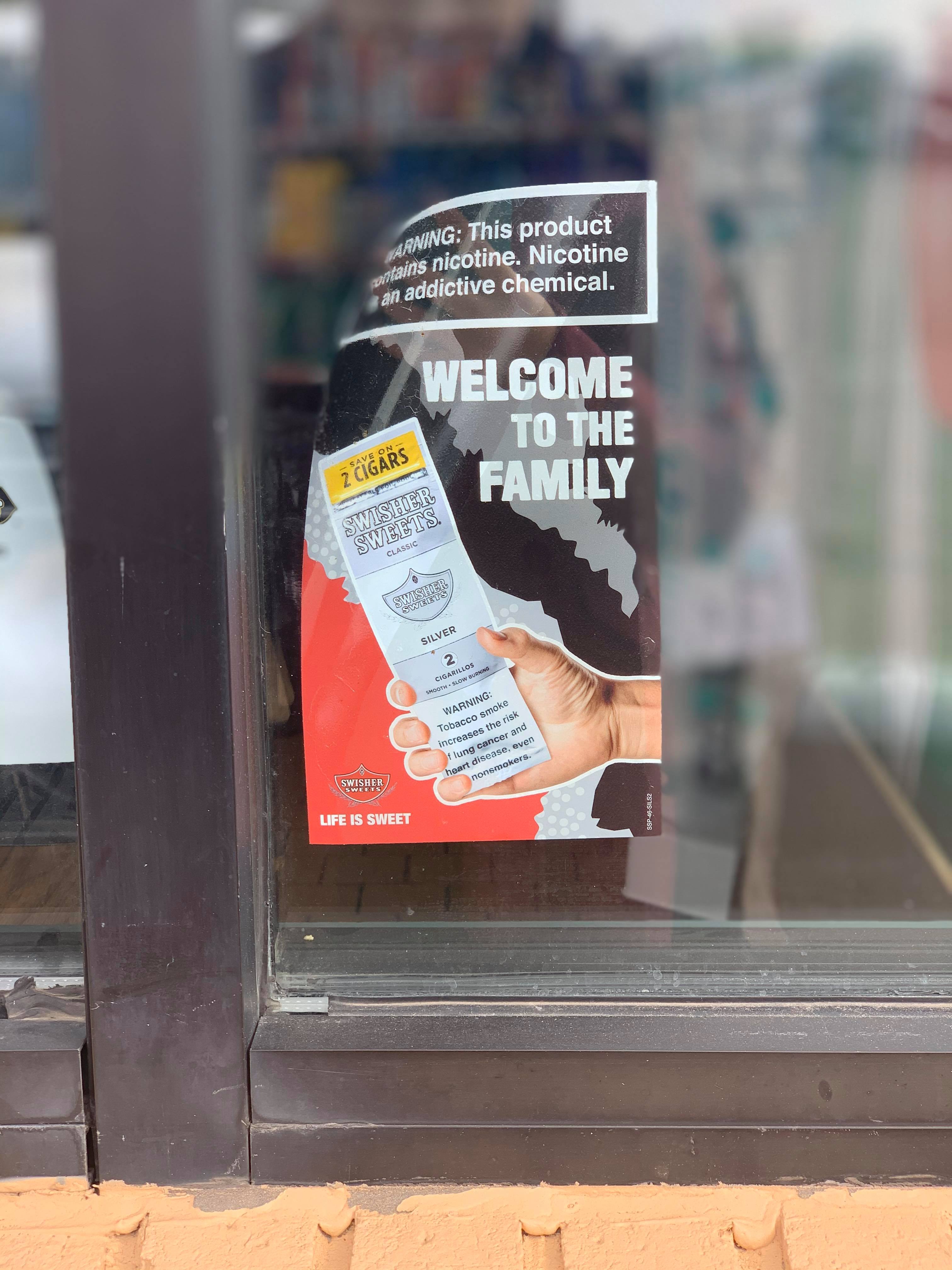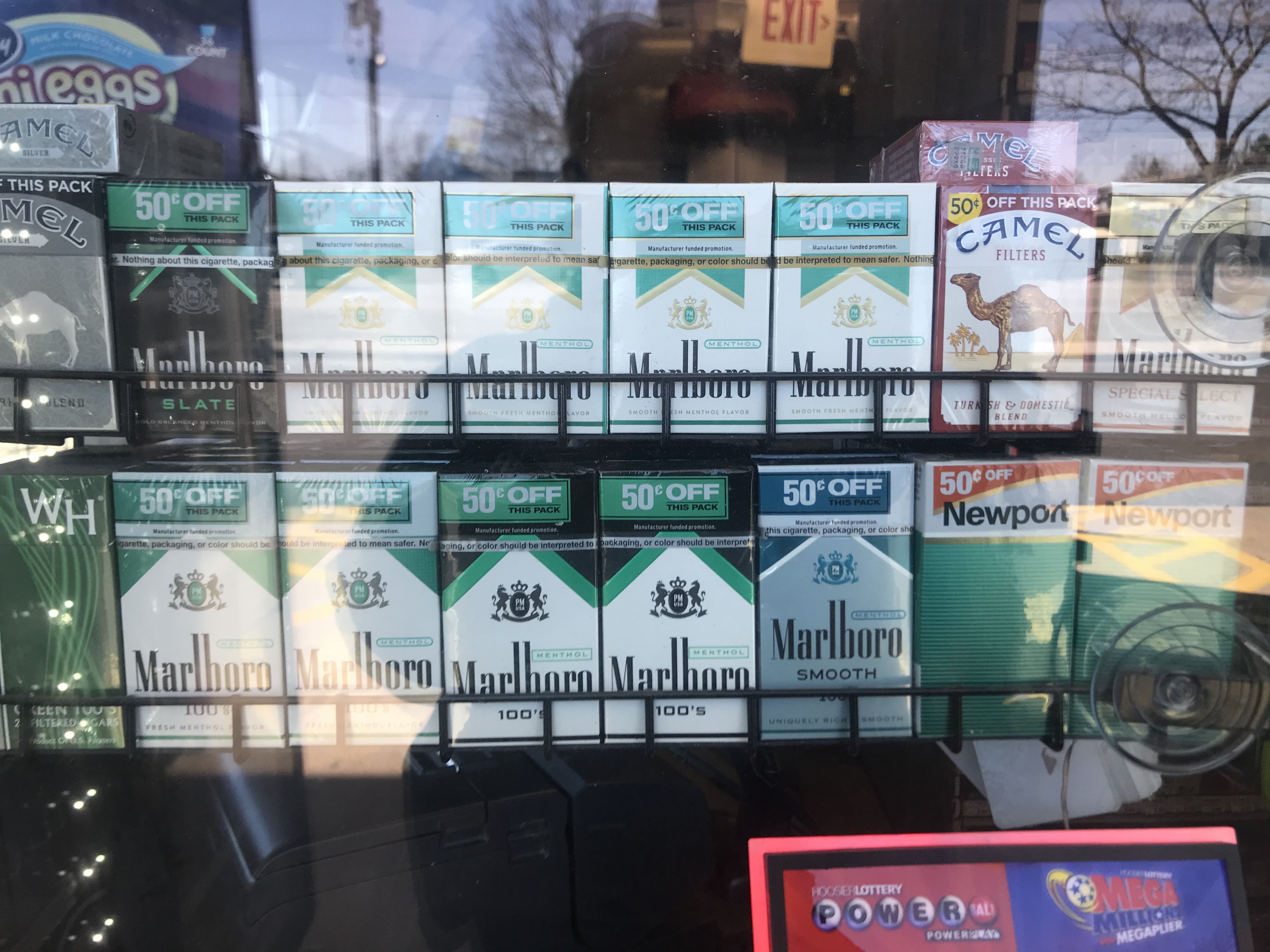Welcome to CounterTobacco.org’s “News and Research Roundup!” Each month we post a summary of the latest research, reports, and news stories on counteracting tobacco product sales and marketing at the point of sale (POS). Keeping up with what’s happening in the POS movement all across the country can help you choose policies and strategies that work best for your community. New research can help provide support for your work and evidence for the importance of the “War in the Store.” Have a story you don’t want us to miss? E-mail it to us!
New Research
Disparities
- Real-Time Context of Tobacco Marketing Exposure and Community Vulnerability – An Ecological Momentary Assessment Among Young Adults, Annals of Behavioral Medicine
 This study assessed exposure to tobacco product marketing among young adults aged 18-24 who did not currently use tobacco living via four text-messaging surveys per day over 2 weeks. Researchers found participants were most likely to be exposed to tobacco marketing at stores. They also found that participants who lived in vulnerable communities, defined as those having higher proportions of lower income and racial/ethnic minorities and high smoking rates, were over twice as likely to be exposed to any tobacco marketing and 7 times as likely to be exposed to marketing for flavored tobacco compared to those living in other communities.
This study assessed exposure to tobacco product marketing among young adults aged 18-24 who did not currently use tobacco living via four text-messaging surveys per day over 2 weeks. Researchers found participants were most likely to be exposed to tobacco marketing at stores. They also found that participants who lived in vulnerable communities, defined as those having higher proportions of lower income and racial/ethnic minorities and high smoking rates, were over twice as likely to be exposed to any tobacco marketing and 7 times as likely to be exposed to marketing for flavored tobacco compared to those living in other communities.- Learn more about disparities in point-of-sale tobacco advertising.
- Evaluation of neighborhood deprivation and store characteristics in relation to tobacco retail outlet sales violations, PLOS ONE
- This study of tobacco sales to minors violations across the state of Virginia between 2012- 2021 found that convenience stores were more likely to sell to minors than grocery stores and pharmacies, that tobacco retailers located near another tobacco retailer were more likely to sell to minors, and that tobacco retailers located in neighborhoods with higher deprivation of resource were also more likely to sell to minors. In addition, retailers located in areas of the southwest and southeast of the state were also more likely have sales to minors violations. The researchers conclude that a more targeted approach to compliance checks may be needed to reduce violations. Learn more about tobacco retailer licensing as a regulatory platform that can help reduce sales to minors violations.
Menthol and Other Flavored Tobacco
- Change in retail sales of tobacco products in Ontario after a menthol sales restriction, Tobacco Control
 Retail scanner data from Ontario, Canada, where menthol tobacco product sales were prohibited starting January 1, 2017, show that menthol cigarette sales decreased by 93% in the six months following implementation compared to the year prior. During that same time period, menthol tobacco product sales decreased only 2% in British Columbia, where menthol tobacco product sales were still allowed. In addition, sales of non-menthol cigarettes increased only 0.4% and sales of vaping products decreased in Ontario, indicating that people were not substituting these products for menthol cigarettes. Cigar data was unavailable. While sales of cigarettes with menthol-suggestive descriptors (‘green’, “’blue’, ‘silver’ and ‘fresh’) increased by 11%, most of these cigarettes were not actually menthol. Learn more about menthol
Retail scanner data from Ontario, Canada, where menthol tobacco product sales were prohibited starting January 1, 2017, show that menthol cigarette sales decreased by 93% in the six months following implementation compared to the year prior. During that same time period, menthol tobacco product sales decreased only 2% in British Columbia, where menthol tobacco product sales were still allowed. In addition, sales of non-menthol cigarettes increased only 0.4% and sales of vaping products decreased in Ontario, indicating that people were not substituting these products for menthol cigarettes. Cigar data was unavailable. While sales of cigarettes with menthol-suggestive descriptors (‘green’, “’blue’, ‘silver’ and ‘fresh’) increased by 11%, most of these cigarettes were not actually menthol. Learn more about menthol
- Reactions to sales restrictions on flavored vape products or all vape products among young adults in the US, Nicotine & Tobacco Research
- This study of young adults in six metropolitan areas across the US found that only 24.2% of those who currently use e-cigarettes supported restrictions on the sale of flavored vape products compared to 57.6% of those who did not use e-cigarettes. Of participants who currently use e-cigarettes, 39.1% reported that they were likely continue using e-cigarettes if sales were restricted to tobacco flavor only, while 33.2% reported that they would likely switch to cigarettes. If all vape product sales were banned, 39% reported that they would likely switch to cigarettes. The participants who indicated that they would likely not continue vaping and not switch to cigarettes if these type of policies were implemented also use e-cigarettes less frequently, had never smoked, and had more concerns about the health impacts of e-cigarettes.
Policy Adoption
- Adoption of Tobacco 21: A Cross-case Analysis of Ten US States, International Journal of Environmental Research and Public Health
- This study found that between 2016 -2019, adoption of statewide Tobacco 21 laws was facilitated by factors including an increase in attention on the youth “e-cigarette epidemic,” having an influential policy entrepreneur or champion, and traction from other states or local municipalities passing Tobacco 21. Challenges to adopting Tobacco 21 laws included the influence of the tobacco industry, Tobacco 21 relatively low priority ranking, controversy over bill language.
- Learn more about Tobacco 21 policies.
- Restricting Sales of Menthol Tobacco Products: Lessons Learned from Policy Passage and Implementation in Minneapolis, St. Paul, and Duluth, Minnesota, Health Equity
- Based on 50 key informant interviews with those involved in the 2017 – 2018 passage and implementation of menthol tobacco sales restrictions across the cities of Minneapolis, St. Paul, and Duluth, MN, researchers found that key facilitators of policy passage included strong city council support, leadership from impacted communities, community awareness-building campaigns, and understanding tobacco industry counter-tactics. Challenges to policy passage included the need to counter tobacco industry misinformation and retailer attempts to circumvent the intent of the restrictions. Learn more about menthol.
Emerging Non-Cigarette Tobacco Products
- Balancing Consideration of the Risks and Benefits of E-Cigarettes, American Journal of Public Health
- This article, written by 15 past presidents of the Society for Research on Nicotine and Tobacco, “reviews the health risks of e-cigarette use, the likelihood that vaping increases smoking cessation, concerns about youth vaping, and the need to balance valid concerns about risk to youth with potential benefits of increasing smoking cessation.” They argue that while there are legitimate concerns about youth vaping, that the field of public health is currently not paying enough attention to the potential important role that e-cigarettes could play in helping people who currently smoke to quit. Learn more about e-cigarettes at the point of sale.
- Nicotine Pouch Unit Sales in the US, 2016 – 2020, JAMA Network
Sales of nicotine pouches, which first entered the US market in 2016, nearly tripled from 2016 to 2020. Mint was the most common flavor sold, though sales of fruit flavors grew more rapidly than sales of mint from January 2019 – June 2020. Swedish Match’s “Zyn” nicotine pouches held the most market share at 78.7% in June 2020. These products were mostly sold at convenience stores, which accounted for 97.7% of total sales. Learn more about non-cigarette tobacco products and point-of-sale policy.
- Adolescent Use and Susceptibility to Heated Tobacco Products, Pediatrics
- A survey of 10-12th grade students across California from September 2019 – March 2020 found that 8.9% had heard of heated tobacco products, 0.67% had ever tried them, and 0.20% were currently using them. However, researchers note that this level of awareness is “remarkable given the low availability of [heated tobacco] products at the time of the survey.” They also note that the ratio of students who continue to use heated tobacco products following experimentation is concerning. The survey also found that 18.3% of student who had never tried heated tobacco products were still susceptible to future use. Learn more about heated tobacco products at the point of sale.
Industry News
- Marlboro owner wants to buy a company that makes asthma inhalers. Health charities say it must be stopped, WTVA
- Tobacco and Nicotine Trends to Watch, CSP Daily News
- Altria Raises Cigarette Prices 14 Cents a Pack, CSP Daily News
POS Policy in the Media
Menthol and Other Flavored Tobacco Products
- [CO] Edgewater City Council Unanimously Moves to End Sale of Flavored Tobacco Products, Edgewater ECHO
- [MO] Columbia Board of Health report recommends more vaping restrictions, KOMU
- [CO] Denver Councilmembers Pushing End to Flavored Tobacco Sales, Westword
FDA
- All Eyes on FDA: The Upcoming Regulation of Juul E-Cigarettes – Will the public health be protected? Medpage Today
- Reynolds’ latest menthol-boosting traditional cigarettes draw protest from public-health advocacy groups, Winston-Salem Journal
- Doctors urge FDA action on new menthol cigarettes, flavored cigars, American Medical Association
- It’s Time to End the Sale of All Flavored Tobacco Products, Newsweek
Emerging products
- [WI] Dane County Alliance Against Commercial Tobacco Sounds the Alarm on New Tobacco Product: Nicotine Pouches, City of Madison
- [MA] Big Tobacco’s relentless reimagining of the cigarette returns to Beacon Hill, Boston Globe
Find more stories in last month’s News and Research Roundup.
Know of a story that we missed? Email us, and we’ll be sure to include it in next month’s roundup!


